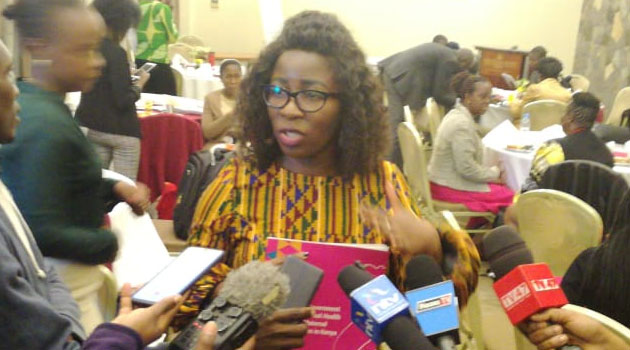
“In all the facilities that we sampled for this study, we saw a pattern where the number of women dying while giving birth increased with the introduction of free maternity services,” Dr Rhoune Ochako (pictured), a researcher, revealed/CFM – Joseph Muraya
NAIROBI, Kenya, Dec 10 – A new study on the impact of government-supported maternal health programmes in the country paints a dim picture of the initiative, with numbers of women opting for the free services drastically reducing over the years.
The study which focused on Nairobi, Migori and Kilifi counties and carried out by the Open Society of East Africa, points out that the programme was largely a political declaration that was made notwithstanding the glaring incapacities in health facilities.
Speaking on Tuesday when the study was launched, Prof Owuor Olungah, the lead researcher pointed out that the numbers were high in 2014 after the programme was launched but decried that they have been dropping due to poor quality of services.
“Although the number of people seeking maternal health services as a result of the abolition of user fees increased, this was not matched with an increase in the number of health providers offering services, health commodities and general infrastructure,” Prof Olungah said.
“This greatly compromised the quality of services offered in the health facilities.”
In the 2013-2014 financial year, the national government committed a whopping Sh3.8 billion to fund the free maternal health care programme, in a move that was meant to cover some 60 per cent of women who delivered at home, resulting in 6,000 deaths of mothers annually.
Among the major impediments highlighted in the report include lack of resources, lack of proper accountability and stakeholder involvement.
In some cases, health facilities are offering services without the promised reimbursements, the report noted.
It further revealed that the amount of money being reimbursed to health facilities for maternal health services was inadequate to provide quality services.
As a result, it revealed that mothers are being asked to buy supplies like gloves, cotton wool, and spirit to be used for delivery.
In some instances, “the money was not reimbursed in time, denying the facilities the much-needed resources for use in services delivery.”
“The present Sh2,500 for levels 2 and 3 facilities and Sh5,000 for levels 4 and 5 facilities are not just unrealistic but completely undervalued. The costing of services such as cesarean section should be reviewed to reflect the actual cost of providing such services. A normal delivery should cost about Sh16,000 while cesarean section should be about Sh30,000 depending on the level of complications,” Prof Olungah said.
Though it does not capture statistics, the study said there was an increase in maternal deaths following the implementation of free maternity initiative.
This was attributed to increased utilization of maternal health care services in health facilities that are not matched with the increase in resources required to deliver the services and possibility of women seeking health care services when it is already late.
“In all the facilities that we sampled for this study, we saw a pattern where the number of women dying while giving birth increased with the introduction of free maternity services,” Dr Rhoune Ochako, a researcher, revealed.
“Health care, and more so pregnancy, has been a personal challenge not affecting anyone else. The individual, family and immediate relatives suffer in silence without telling anyone what they are going through. Most people end up blaming themselves for not having done enough to save one of their own. This self-inflicted guilt then mars any action that may enhance the accountability of the systems to remedy the situation.”
But Prof Olungah said that “Pregnancy and childbirth is an aspect that must be experienced within the cultural context. All pregnancies can be death sentences and when one dies, you cannot blame anyone.”
It is a study that comes at a time the provision of maternity health care services has been greatly compromised by the frequent health care workers’ strikes.
The study calls on stakeholders in the health sector to prioritize the resolution of the grievances of the health care workers in a bid to avoid numerous industrial actions.








































